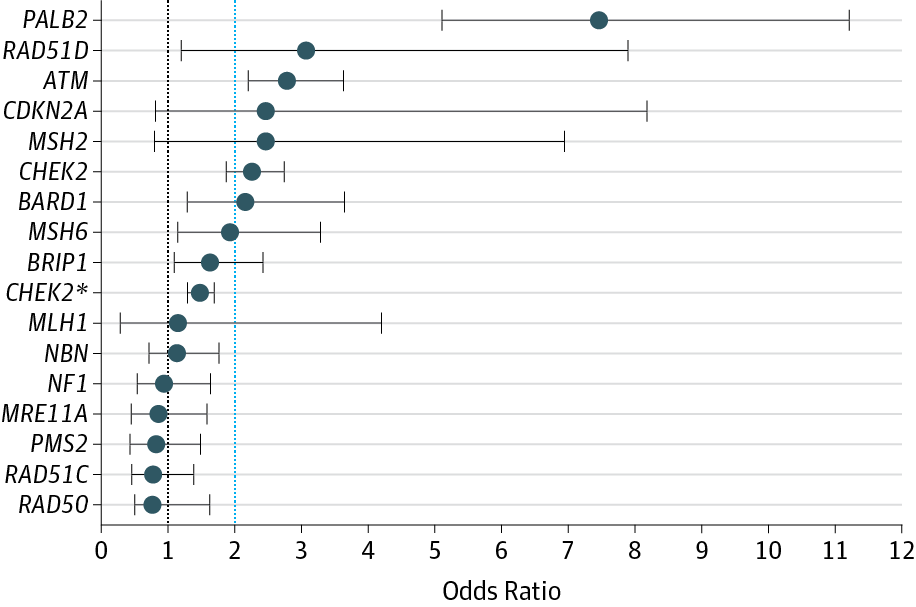当前位置:
X-MOL 学术
›
JAMA Oncol.
›
论文详情
Our official English website, www.x-mol.net, welcomes your
feedback! (Note: you will need to create a separate account there.)
Associations Between Cancer Predisposition Testing Panel Genes and Breast Cancer.
JAMA Oncology ( IF 22.5 ) Pub Date : 2017-09-01 , DOI: 10.1001/jamaoncol.2017.0424 Fergus J Couch 1, 2 , Hermela Shimelis 1 , Chunling Hu 1 , Steven N Hart 2 , Eric C Polley 2 , Jie Na 2 , Emily Hallberg 2 , Raymond Moore 2 , Abigail Thomas 1 , Jenna Lilyquist 1 , Bingjian Feng 3 , Rachel McFarland 4 , Tina Pesaran 4 , Robert Huether 4 , Holly LaDuca 4 , Elizabeth C Chao 4, 5 , David E Goldgar 3 , Jill S Dolinsky 4
JAMA Oncology ( IF 22.5 ) Pub Date : 2017-09-01 , DOI: 10.1001/jamaoncol.2017.0424 Fergus J Couch 1, 2 , Hermela Shimelis 1 , Chunling Hu 1 , Steven N Hart 2 , Eric C Polley 2 , Jie Na 2 , Emily Hallberg 2 , Raymond Moore 2 , Abigail Thomas 1 , Jenna Lilyquist 1 , Bingjian Feng 3 , Rachel McFarland 4 , Tina Pesaran 4 , Robert Huether 4 , Holly LaDuca 4 , Elizabeth C Chao 4, 5 , David E Goldgar 3 , Jill S Dolinsky 4
Affiliation

|
Importance
Germline pathogenic variants in BRCA1 and BRCA2 predispose to an increased lifetime risk of breast cancer. However, the relevance of germline variants in other genes from multigene hereditary cancer testing panels is not well defined.
Objective
To determine the risks of breast cancer associated with germline variants in cancer predisposition genes.
Design, Setting, and Participants
A study population of 65 057 patients with breast cancer receiving germline genetic testing of cancer predisposition genes with hereditary cancer multigene panels. Associations between pathogenic variants in non-BRCA1 and non-BRCA2 predisposition genes and breast cancer risk were estimated in a case-control analysis of patients with breast cancer and Exome Aggregation Consortium reference controls. The women underwent testing between March 15, 2012, and June 30, 2016.
Main Outcomes and Measures
Breast cancer risk conferred by pathogenic variants in non-BRCA1 and non-BRCA2 predisposition genes.
Results
The mean (SD) age at diagnosis for the 65 057 women included in the analysis was 48.5 (11.1) years. The frequency of pathogenic variants in 21 panel genes identified in 41 611 consecutively tested white women with breast cancer was estimated at 10.2%. After exclusion of BRCA1, BRCA2, and syndromic breast cancer genes (CDH1, PTEN, and TP53), observed pathogenic variants in 5 of 16 genes were associated with high or moderately increased risks of breast cancer: ATM (OR, 2.78; 95% CI, 2.22-3.62), BARD1 (OR, 2.16; 95% CI, 1.31-3.63), CHEK2 (OR, 1.48; 95% CI, 1.31-1.67), PALB2 (OR, 7.46; 95% CI, 5.12-11.19), and RAD51D (OR, 3.07; 95% CI, 1.21-7.88). Conversely, variants in the BRIP1 and RAD51C ovarian cancer risk genes; the MRE11A, RAD50, and NBN MRN complex genes; the MLH1 and PMS2 mismatch repair genes; and NF1 were not associated with increased risks of breast cancer.
Conclusions and Relevance
This study establishes several panel genes as high- and moderate-risk breast cancer genes and provides estimates of breast cancer risk associated with pathogenic variants in these genes among individuals qualifying for clinical genetic testing.
中文翻译:

癌症易感性测试面板基因与乳腺癌之间的关联。
重要性 BRCA1 和 BRCA2 的种系致病性变异容易增加终生患乳腺癌的风险。然而,来自多基因遗传性癌症测试组的其他基因中种系变异的相关性尚未明确定义。目的 确定与癌症易感基因种系变异相关的乳腺癌风险。设计、设置和参与者 65 057 名乳腺癌患者的研究人群接受遗传性癌症多基因组对癌症易感基因的种系基因检测。通过对乳腺癌患者和外显子组聚合联盟参考对照进行病例对照分析,评估了非 BRCA1 和非 BRCA2 易感基因的致病性变异与乳腺癌风险之间的关联。这些女性在 2012 年 3 月 15 日至 2016 年 6 月 30 日期间接受了检测。 主要结果和措施 非 BRCA1 和非 BRCA2 易感基因的致病性变异赋予乳腺癌风险。结果 分析中纳入的 65 057 名女性诊断时的平均 (SD) 年龄为 48.5 (11.1) 岁。在 41 611 名连续测试的患有乳腺癌的白人女性中鉴定出的 21 个组基因的致病性变异频率估计为 10.2%。排除 BRCA1、BRCA2 和综合征性乳腺癌基因(CDH1、PTEN 和 TP53)后,观察到的 16 个基因中有 5 个基因的致病性变异与高度或中度增加的乳腺癌风险相关:ATM(OR,2.78;95% CI , 2.22-3.62)、BARD1 (OR, 2.16; 95% CI, 1.31-3.63)、CHEK2 (OR, 1.48; 95% CI, 1.31-1.67)、PALB2 (OR, 7.46; 95% CI, 5.12-11.19)和 RAD51D(OR,3.07;95% CI,1.21-7.88)。 相反,BRIP1 和 RAD51C 卵巢癌风险基因的变异; MRE11A、RAD50 和 NBN MRN 复合体基因; MLH1 和 PMS2 错配修复基因; NF1 和 NF1 与乳腺癌风险增加无关。结论和相关性本研究将几个面板基因确定为高风险和中风险乳腺癌基因,并提供了对有资格进行临床基因检测的个体中与这些基因的致病性变异相关的乳腺癌风险的估计。
更新日期:2017-10-06
中文翻译:

癌症易感性测试面板基因与乳腺癌之间的关联。
重要性 BRCA1 和 BRCA2 的种系致病性变异容易增加终生患乳腺癌的风险。然而,来自多基因遗传性癌症测试组的其他基因中种系变异的相关性尚未明确定义。目的 确定与癌症易感基因种系变异相关的乳腺癌风险。设计、设置和参与者 65 057 名乳腺癌患者的研究人群接受遗传性癌症多基因组对癌症易感基因的种系基因检测。通过对乳腺癌患者和外显子组聚合联盟参考对照进行病例对照分析,评估了非 BRCA1 和非 BRCA2 易感基因的致病性变异与乳腺癌风险之间的关联。这些女性在 2012 年 3 月 15 日至 2016 年 6 月 30 日期间接受了检测。 主要结果和措施 非 BRCA1 和非 BRCA2 易感基因的致病性变异赋予乳腺癌风险。结果 分析中纳入的 65 057 名女性诊断时的平均 (SD) 年龄为 48.5 (11.1) 岁。在 41 611 名连续测试的患有乳腺癌的白人女性中鉴定出的 21 个组基因的致病性变异频率估计为 10.2%。排除 BRCA1、BRCA2 和综合征性乳腺癌基因(CDH1、PTEN 和 TP53)后,观察到的 16 个基因中有 5 个基因的致病性变异与高度或中度增加的乳腺癌风险相关:ATM(OR,2.78;95% CI , 2.22-3.62)、BARD1 (OR, 2.16; 95% CI, 1.31-3.63)、CHEK2 (OR, 1.48; 95% CI, 1.31-1.67)、PALB2 (OR, 7.46; 95% CI, 5.12-11.19)和 RAD51D(OR,3.07;95% CI,1.21-7.88)。 相反,BRIP1 和 RAD51C 卵巢癌风险基因的变异; MRE11A、RAD50 和 NBN MRN 复合体基因; MLH1 和 PMS2 错配修复基因; NF1 和 NF1 与乳腺癌风险增加无关。结论和相关性本研究将几个面板基因确定为高风险和中风险乳腺癌基因,并提供了对有资格进行临床基因检测的个体中与这些基因的致病性变异相关的乳腺癌风险的估计。











































 京公网安备 11010802027423号
京公网安备 11010802027423号